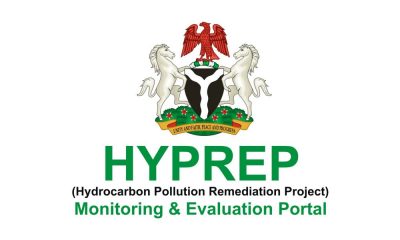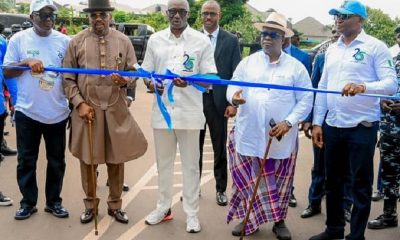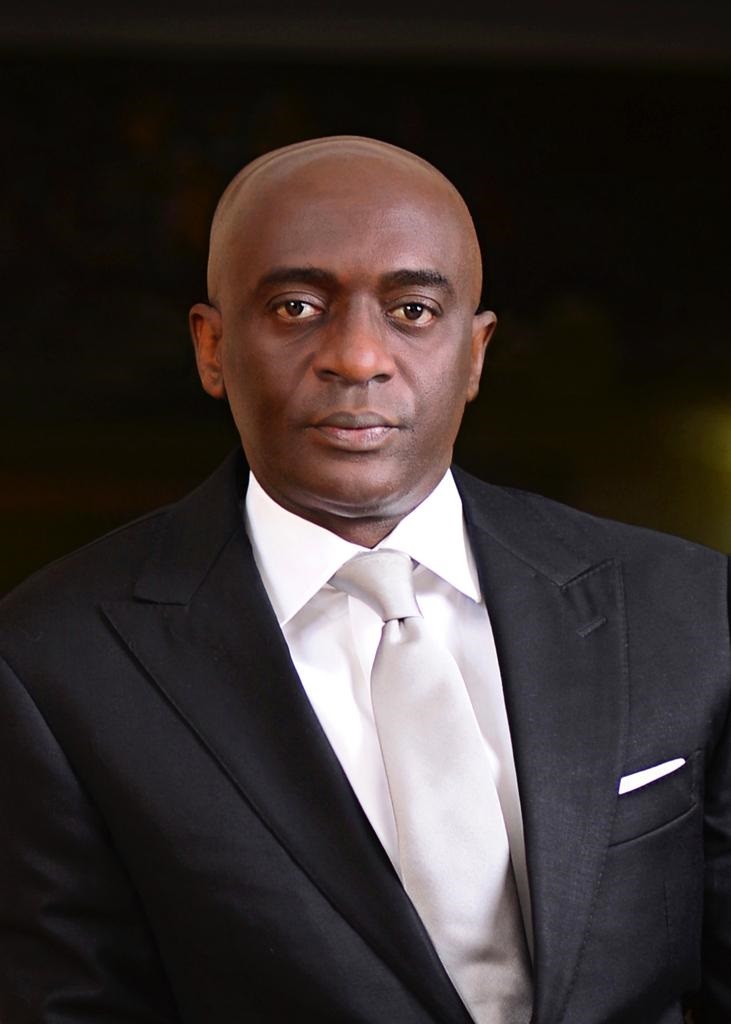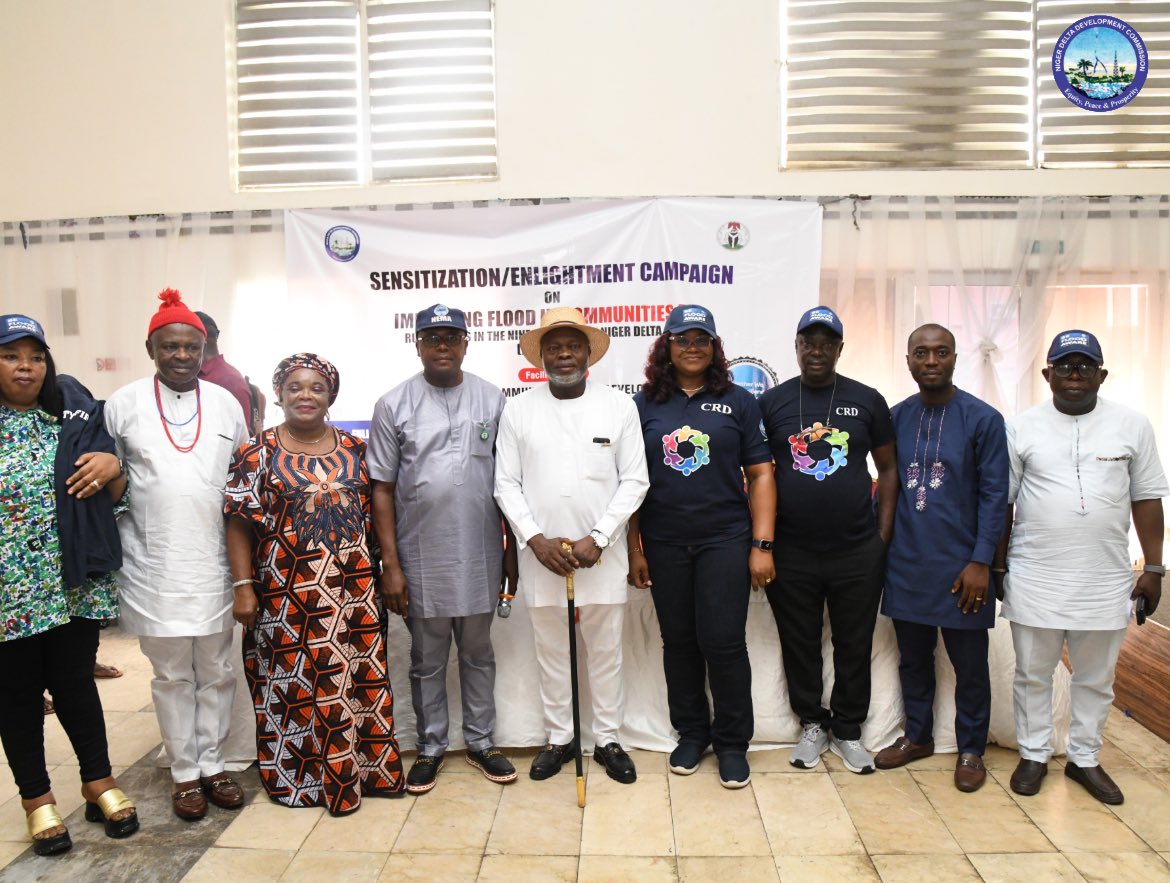Feature/OPED
Why NDDC Board Should Sustain the Hopeful Signs

By Jerome-Mario Utomi
There exists a time-honoured notion among management experts that for every given task, there is always a strategy to achieve the desired results. In planning, you may have more than one strategy which could be labelled as ‘Plan-A’ and ‘Plan-B’ or even more.
Chiedu Ebie, Chairman of the newly constituted Governing Board of the Niger Delta Development Commission, recently demonstrated the understanding that NDDC as an interventionist agency is not left out in clarion formulation of strategies needed for getting hold of stakeholders and converting their support to a springboard for the right vision that will set the tone for sustainable development of the Niger Delta region.
Part of this identified hopeful sign was exemplified in his recent declaration during a facility tour of the NDDC headquarters in Port Harcourt, Rivers state, that the new board and executive management will take basic steps that would inform the rollout of new strategies to drive the development process in Nigeria’s oil-rich region.
That is not the only evidence.
A peep into his acceptance speech during the board’s inauguration also reveals a new leadership that is not only interested in changing the narrative of the region but laced with a burning desire to unleash objectives that inspire new order within the Niger Delta space.
Although public leadership is a very difficult responsibility, however, this piece believed and still believes that the people of the Niger Delta region will no doubt enjoy the well-pledged commitment of the new leadership and its right vision.
Supporting the above assertion is Ebie’s promise that the Board will look back at the vision and history of NDDC’s 23-year existential journey, aligning it with current realities and the objectives of the current administration as such approach will illuminate the yearning needs of the people of the Niger Delta, identify the commission’s challenges, and proffer Workable solutions.
There is yet, another hopeful sign.
Aside from promising that the new board will adopt effective communication with key stakeholders as paramount in the discharge of its duties as this will foster trust, restore transparency and promote accountability; all of which are of great importance to the people of the region and Nigeria in general, also alluring to all was his promise that the board will honour and collaborate with critical stakeholders in the region, execute legacy projects based on detailed needs assessment, seek strategic collaborations and partnerships with opinion leaders, community leaders, professionals and development partners to leverage constructive and attainable outlooks.
For me, the question that is as important as the piece itself are; why must Niger Deltans and Nigerians as a whole applaud this new leadership vision and hopeful expectations in the Niger Delta region? Is the promised change of narrative in the region by the new board not too early to celebrate?
First and very fundamental, those who have followed the protracted public leadership provision in the region will agree without a doubt that the inability of these past leaders to conceptualize their objectives set the stage for the region’s backward and degraded environment. This was further exacerbated by crude oil exploration, exploitation and production without disciplined compliance with international best practices, thereby turning into a region where the communal right to a clean environment and access to clean water supplies is violated.
Secondly, the region as it presently postures symbolizes a location where previous governments employed a non-participatory approach to development, an approach that stripped the people of the Niger Delta sense of ownership over their issues, where the government and other Nigerians failed to see the problem of the region as a national one and not restricted to the region.
Thirdly and very key, it is a zone where fierce war has been raging between ethnic and social forces in Nigeria over the ownership and control of oil resources. And as a direct result, a long dark shadow has been cast on efforts to improve the well-being and economic development of the region’s peoples and communities.
While Ebie’s new resolve and verbal declarations are celebrated, this piece insists that as a nation, we are faced with the choice of nation-building in a much larger context and this particular recognition wholly explains why the board must take these declarations beyond words and have same sustainably translated to action.
For a very long time, the people of the region received from successive administrations in the country responses that seemed substantive but were not, and today, they are beginning to feel as if they were being manipulated.
At different times and places, they listened with real curiosity to comments by public officials promising to solve the problem of the region. But up till now, the challenges are still alive and active in the region and the politics that kept it going have flourished unabated.
Out of so many such examples of failed/abandoned promises, those of the immediate past administration stand out. Nigeria’s former Vice President, Professor Yemi Osinbajo, in 2021, at a function in Lagos, told the gathering that the former President Muhammadu Buhari-led administration was determined to ensure the completion of all the critical projects it embarked upon in the region. He specifically stated that FG will address present energy demands and empower the Niger Delta people through promoting local content.
He noted that the Federal Government will in no distant time complete three Modular Refineries in the region. These refineries according to him include the Niger Delta Petroleum Resources, NDPR, Modular Refinery in Rivers State; OPAC Modular Refinery in Delta State and Walter Smith Modular Refinery in Imo State.
On that day, at that time and in that place, the former Vice President also said that the remediation exercise in Ogoni land, under the recommendations of UNEP, shall be completed in no distant time. He specifically underlined that the clean-up commenced in January 2019, and a total of about 57 sites have so far been handed over to contractors by the Hydrocarbon Pollution Remediation Project (HYPREP) under the Federal Ministry of Environment, noting that the Ogoni clean-up will be the first of its kind in the history of the Niger Delta to be handled by the Federal Government for remediation activities within the region.
He said the Federal Government was also developing several deep-sea ports across the region, including the Bonny, Warri and Ibom Deep Sea ports, among other development projects such as the establishment of Export Processing Zones to boost economic activities.
Today, while this piece may not have the capacity to judge the outgone Federal government offered the people of the region forlorn hopes, signals coming out from Ogoni land show that the area is still heavily burdened with environmental injustice and those who believed the former Vice President has finally realized that nothing has changed.
The same ugly fate was visited on the promised deep sea ports across the region. The Bonny, Warri and Ibom Deep Sea ports, among other development projects, have remained in limbo while the government that made the promise is now rested. The people of the region are still waiting like doves for the promised establishment of Export Processing Zones to boost economic activities.
The new NDDC board must do all within its power to avoid the ‘culture’ of promise and failure as witnessed in the past by the people of the region.
Finally, even though it will be highly celebrated by all of the board in the open gives a clear definition of the region’s problems, the goals to be achieved, or the means chosen to address the problems and to achieve the goals for the people to see, this piece on its part holds the opinion that it will be safer for the board to imbibe the culture of silence, keep their programmes close to their heart and allow the people to speculate than trying to entice the people with proposed projects and programmes and through the process falls into the trap of ‘promise and fail’ which characterized previous efforts in the region.
Jerome-Mario Utomi is the Programme Coordinator for Media and Public Policy at the Social and Economic Justice Advocacy (SEJA), a Lagos-based Non-Governmental Organisation (NGO). He can be reached via Je*********@***oo.com or 09032725374
Feature/OPED
How Christians Can Stay Connected to Their Faith During This Lenten Period

It’s that time of year again, when Christians come together in fasting and prayer. Whether observing the traditional Lent or entering a focused period of reflection, it’s a chance to connect more deeply with God, and for many, this season even sets the tone for the year ahead.
Of course, staying focused isn’t always easy. Life has a way of throwing distractions your way, a nosy neighbour, a bus driver who refuses to give you your change, or that colleague testing your patience. Keeping your peace takes intention, and turning off the noise and staying on course requires an act of devotion.
Fasting is meant to create a quiet space in your life, but if that space isn’t filled with something meaningful, old habits can creep back in. Sustaining that focus requires reinforcement beyond physical gatherings, and one way to do so is to tune in to faith-based programming to remain spiritually aligned throughout the period and beyond.
On GOtv, Christian channels such as Dove TV channel 113, Faith TV and Trace Gospel provide sermons, worship experiences and teachings that echo what is being practised in churches across the country.
From intentional conversations on Faith TV on GOtv channel 110 to true worship on Trace Gospel on channel 47, these channels provide nurturing content rooted in biblical teaching, worship, and life application. Viewers are met with inspiring sermons, reflections on scripture, and worship sessions that help form a rhythm of devotion. During fasting periods, this kind of consistent spiritual input becomes a source of encouragement, helping believers stay anchored in prayer and mindful of God’s presence throughout their daily routines.
To catch all these channels and more, simply subscribe, upgrade, or reconnect by downloading the MyGOtv App or dialling *288#. You can also stream anytime with the GOtv Stream App.
Plus, with the We Got You offer, available until 28th February 2026, subscribers automatically upgrade to the next package at no extra cost, giving you access to more channels this season.
Feature/OPED
Turning Stolen Hardware into a Data Dead-End

By Apu Pavithran
In Johannesburg, the “city of gold,” the most valuable resource being mined isn’t underground; it’s in the pockets of your employees.
With an average of 189 cellphones reported stolen daily in South Africa, Gauteng province has become the hub of a growing enterprise risk landscape.
For IT leaders across the continent, a “lost phone” is rarely a matter of a misplaced device. It is frequently the result of a coordinated “snatch and grab,” where the hardware is incidental, and corporate data is the true objective.
Industry reports show that 68% of company-owned device breaches stem from lost or stolen hardware. In this context, treating mobile security as a “nice-to-have” insurance policy is no longer an option. It must function as an operational control designed for inevitability.
In the City of Gold, Data Is the Real Prize
When a fintech agent’s device vanishes, the $300 handset cost is a rounding error. The real exposure lies in what that device represents: authorised access to enterprise systems, financial tools, customer data, and internal networks.
Attackers typically pursue one of two outcomes: a quick wipe for resale on the secondary market or, far more dangerously, a deep dive into corporate apps to extract liquid assets or sellable data.
Clearly, many organisations operate under the dangerous assumption that default manufacturer security is sufficient. In reality, a PIN or fingerprint is a flimsy barrier if a device is misconfigured or snatched while unlocked. Once an attacker gets in, they aren’t just holding a phone; they are holding the keys to copy data, reset passwords, or even access admin tools.
The risk intensifies when identity-verification systems are tied directly to the compromised device. Multi-Factor Authentication (MFA), widely regarded as a gold standard, can become a vulnerability if the authentication factor and the primary access point reside on the same compromised device. In such cases, the attacker may not just have a phone; they now have a valid digital identity.
The exposure does not end at authentication. It expands with the structure of the modern workforce.
65% of African SMEs and startups now operate distributed teams. The Bring Your Own Device (BYOD) culture has left many IT departments blind to the health of their fleet, as personal devices may be outdated or jailbroken without any easy way to know.
Device theft is not new in Africa. High-profile incidents, including stolen government hardware, reinforce a simple truth: physical loss is inevitable. The real measure of resilience is whether that loss has any residual value. You may not stop the theft. But you can eliminate the reward.
Theft Is Inevitable, Exposure is Not
If theft cannot always be prevented, systems must be designed so that stolen devices yield nothing of consequence. This shift requires structured, automated controls designed to contain risk the moment loss occurs.
Develop an Incident Response Plan (IRP)
The moment a device is reported missing, predefined actions should trigger automatically: access revocation, session termination, credential reset and remote lock or wipe.
However, such technical playbooks are only as fast as the people who trigger them. Employees must be trained as the first line of defence —not just in the use of strong PINs and biometrics, but in the critical culture of immediate reporting. In high-risk environments, containment windows are measured in minutes, not hours.
Audit and Monitor the Fleet Regularly
Control begins with visibility. Without a continuous, comprehensive audit, IT teams are left responding to incidents after damage has occurred.
Opting for tools like Endpoint Detection and Response (EDR) allows IT teams to spot subtle, suspicious activities or unusual access attempts that signal a compromised device.
Review Device Security Policies
Security controls must be enforced at the management layer, not left to user discretion. Encryption, patch updates and screen-lock policies should be mandatory across corporate devices.
In BYOD environments, ownership-aware policies are essential. Corporate data must remain governed by enterprise controls regardless of device ownership.
Decouple Identity from the Device
Legacy SMS-based authentication models introduce avoidable risk when the authentication channel resides on the compromised handset. Stronger identity models, including hardware tokens, reduce this dependency.
At the same time, native anti-theft features introduced by Apple and Google, such as behavioural theft detection and enforced security delays, add valuable defensive layers. These controls should be embedded into enterprise baselines rather than treated as optional enhancements.
When Stolen Hardware Becomes Worthless
With POPIA penalties now reaching up to R10 million or a decade of imprisonment for serious data loss offences, the Information Regulator has made one thing clear: liability is strict, and the financial fallout is absolute. Yet, a PwC survey reveals a staggering gap: only 28% of South African organisations are prioritising proactive security over reactive firefighting.
At the same time, the continent is battling a massive cybersecurity skills shortage. Enterprises simply do not have the boots on the ground to manually patch every vulnerability or chase every “lost” terminal. In this climate, the only viable path is to automate the defence of your data.
Modern mobile device management (MDM) platforms provide this automation layer.
In field operations, “where” is the first indicator of “what.” If a tablet assigned to a Cape Town district suddenly pings on a highway heading out of the city, you don’t need a notification an hour later—you need an immediate response. An effective MDM system offers geofencing capabilities, automatically triggering a remote lock when devices breach predefined zones.
On Supervised iOS and Android Enterprise devices, enforced Factory Reset Protection (FRP) ensures that even after a forced wipe, the device cannot be reactivated without organisational credentials, eliminating resale value.
For BYOD environments, we cannot ignore the fear that corporate oversight equates to a digital invasion of personal lives. However, containerization through managed Work Profiles creates a secure boundary between corporate and personal data. This enables selective wipe capabilities, removing enterprise assets without intruding on personal privacy.
When integrated with identity providers, device posture and user identity can be evaluated together through multi-condition compliance rules. Access can then be granted, restricted, or revoked based on real-time risk signals.
Platforms built around unified endpoint management and identity integration enable this model of control. At Hexnode, this convergence of device governance and identity enforcement forms the foundation of a proactive security mandate. It transforms mobile fleets from distributed risk points into centrally controlled assets.
In high-risk environments, security cannot be passive. The goal is not recovery. It is irrelevant, ensuring that once a device leaves authorised hands, it holds no data, no identity leverage, and no operational value.
Apu Pavithran is the CEO and founder of Hexnode
Feature/OPED
Daniel Koussou Highlights Self-Awareness as Key to Business Success

By Adedapo Adesanya
At a time when young entrepreneurs are reshaping global industries—including the traditionally capital-intensive oil and gas sector—Ambassador Daniel Koussou has emerged as a compelling example of how resilience, strategic foresight, and disciplined execution can transform modest beginnings into a thriving business conglomerate.
Koussou, who is the chairman of the Nigeria Chapter of the International Human Rights Observatory-Africa (IHRO-Africa), currently heads the Committee on Economic Diplomacy, Trade and Investment for the forum’s Nigeria chapter. He is one of the young entrepreneurs instilling a culture of nation-building and leadership dynamics that are key to the nation’s transformation in the new millennium.
The entrepreneurial landscape in Nigeria is rapidly evolving, with leaders like Koussou paving the way for innovation and growth, and changing the face of the global business climate. Being enthusiastic about entrepreneurship, Koussou notes that “the best thing that can happen to any entrepreneur is to start chasing their dreams as early as possible. One of the first things I realised in life is self-awareness. If you want to connect the dots, you must start early and know your purpose.”
Successful business people are passionate about their business and stubbornly driven to succeed. Koussou stresses the importance of persistence and resilience. He says he realised early that he had a ‘calling’ and pursued it with all his strength, “working long weekends and into the night, giving up all but necessary expenditures, and pressing on through severe setbacks.”
However, he clarifies that what accounted for an early success is not just tenacity but also the ability to adapt, to recognise and respond to rapidly changing markets and unexpected events.
Ambassador Koussou is the CEO of Dau-O GIK Oil and Gas Limited, an indigenous oil and natural gas company with a global outlook, delivering solutions that power industries, strengthen communities, and fuel progress. The firm’s operations span exploration, production, refining, and distribution.
Recognising the value of strategic alliances, Koussou partners with business like-minds, a move that significantly bolsters Dau-O GIK’s credibility and capacity in the oil industry. This partnership exemplifies the importance of building strong networks and collaborations.
The astute businessman, who was recently nominated by the African Union’s Agenda 2063 as AU Special Envoy on Oil and Gas (Continental), admonishes young entrepreneurs to be disciplined and firm in their decision-making, a quality he attributed to his success as a player in the oil and gas sector. By embracing opportunities, building strong partnerships, and maintaining a commitment to excellence, Koussou has not only achieved personal success but has also set a benchmark for future generations of African entrepreneurs.
His journey serves as a powerful reminder that with determination and vision, success is within reach.
-

 Feature/OPED6 years ago
Feature/OPED6 years agoDavos was Different this year
-
Travel/Tourism10 years ago
Lagos Seals Western Lodge Hotel In Ikorodu
-

 Showbiz3 years ago
Showbiz3 years agoEstranged Lover Releases Videos of Empress Njamah Bathing
-

 Banking8 years ago
Banking8 years agoSort Codes of GTBank Branches in Nigeria
-

 Economy3 years ago
Economy3 years agoSubsidy Removal: CNG at N130 Per Litre Cheaper Than Petrol—IPMAN
-

 Banking3 years ago
Banking3 years agoSort Codes of UBA Branches in Nigeria
-

 Banking3 years ago
Banking3 years agoFirst Bank Announces Planned Downtime
-

 Sports3 years ago
Sports3 years agoHighest Paid Nigerian Footballer – How Much Do Nigerian Footballers Earn



















